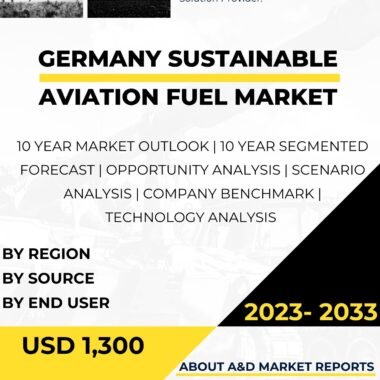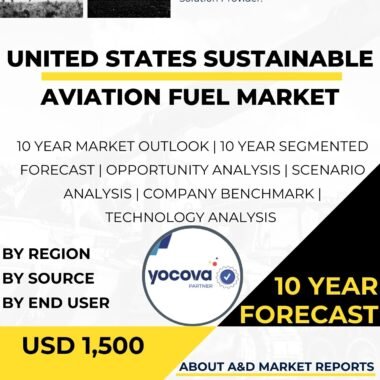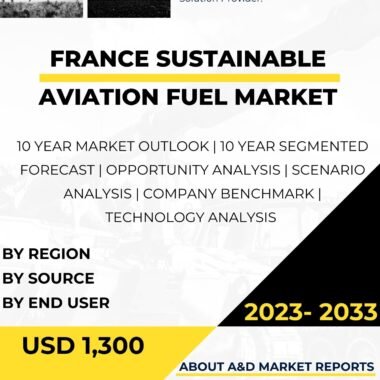Description
The Italy Sustainable Aviation Fuel (SAF) Market is an increasingly vital and rapidly evolving segment within the country’s aviation and energy sectors, dedicated to providing advanced and environmentally friendly alternatives to conventional aviation fuels. Sustainable aviation fuel, also known as biojet fuel or renewable jet fuel, is derived from sustainable feedstocks such as biomass, waste materials, and algae. The Italy Sustainable Aviation Fuel Market reflects the nation’s commitment to environmental sustainability and reducing greenhouse gas emissions in the aviation industry as it strives to adopt cleaner and more sustainable energy solutions for its aviation sector.
Italy’s strategic location in Europe and its substantial air traffic volume emphasize the significance of adopting sustainable aviation fuel to mitigate the environmental impact of aviation operations. The Italy Sustainable Aviation Fuel Market is driven by the need to align with global efforts to combat climate change and reduce the aviation industry’s carbon footprint.
The Italy Sustainable Aviation Fuel Market encompasses a diverse range of stakeholders, including biofuel producers, aviation companies, research institutions, and government agencies. These stakeholders collaborate to develop and promote the production and adoption of sustainable aviation fuel in Italy’s aviation sector.
One of the key players in the Italy Sustainable Aviation Fuel Market is ENI, an Italian multinational energy company with significant expertise in renewable energy and biofuels. ENI’s involvement in sustainable aviation fuel production exemplifies Italy’s capabilities in the energy sector.
The Italy Sustainable Aviation Fuel Market also benefits from international collaborations and partnerships to enhance expertise and knowledge sharing. Joint research and development initiatives and technology transfers contribute to Italy’s competitiveness in the global market for sustainable aviation fuel.
The Italy Sustainable Aviation Fuel Market faces several challenges and opportunities. One of the primary challenges is the need to scale up sustainable aviation fuel production and distribution to meet the aviation industry’s growing demand. Developing and implementing cost-effective production processes and establishing a reliable supply chain are crucial for the widespread adoption of sustainable aviation fuel.
Additionally, the Italy Sustainable Aviation Fuel Market must address the challenge of feedstock availability and sustainability. Ensuring a diverse and sustainable supply of feedstocks for biojet fuel production is essential to avoid competition with food production and safeguarding ecosystems.
Moreover, the Italy Sustainable Aviation Fuel Market must address the challenge of regulatory and policy frameworks to support the adoption of sustainable aviation fuel. Providing incentives, mandates, and favorable policies can encourage airlines and aviation companies to integrate sustainable aviation fuel into their operations.
Despite these challenges, the Italy Sustainable Aviation Fuel Market presents numerous opportunities for growth and innovation. The increasing focus on sustainability and environmental responsibility in the aviation sector offers new possibilities for sustainable aviation fuel adoption. Airlines and aviation companies that integrate sustainable aviation fuel into their operations can demonstrate their commitment to reducing carbon emissions and meeting climate targets.
Moreover, the export potential for sustainable aviation fuel enables Italy’s energy industry to expand its market reach and forge international partnerships. Collaboration with other countries in joint research and development projects and the establishment of international sustainable aviation fuel supply chains can contribute to the global transition toward cleaner aviation.
The growing emphasis on advanced technologies and innovation in sustainable aviation fuel production offers opportunities for Italy to develop cutting-edge solutions. Investments in research and development can lead to improved feedstock conversion processes and increased production efficiency, making sustainable aviation fuel more competitive with conventional jet fuel.
Furthermore, the use of sustainable aviation fuel can contribute to Italy’s overall energy security and reduce its dependence on imported fossil fuels. By developing a robust domestic supply chain for sustainable aviation fuel, Italy can enhance its energy resilience and diversify its energy sources.
In conclusion, the Italy Sustainable Aviation Fuel Market is an increasingly vital and rapidly evolving segment within the country’s aviation and energy sectors. The demand for sustainable aviation fuel arises from Italy’s commitment to environmental sustainability and reducing greenhouse gas emissions in the aviation industry. Sustainable aviation fuel offers a cleaner and more environmentally friendly alternative to conventional aviation fuels, aligning with global efforts to combat climate change and reduce the aviation industry’s carbon footprint. By addressing challenges and embracing opportunities, Italy’s energy industry can continue to develop and promote sustainable aviation fuel, contributing to the nation’s environmental goals and positioning Italy as a leader in the global transition to cleaner aviation. Collaboration with domestic and international partners, investments in research and development, and the integration of cutting-edge technologies are essential for the Italy Sustainable Aviation Fuel Market to thrive and maintain a competitive edge in the global energy landscape.




